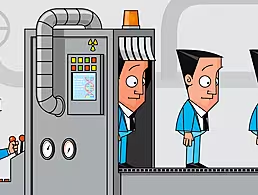Certain pockets of the tech industry will continue their meteoric rise unless knocked off course by some of the many obstacles the coming year may bring. What does the future hold?
Saving clairvoyance, there is no way to know what is yet to come in the world of employment or otherwise. This rings particularly true right now, when geopolitical tension and disorder have reached fever pitch. Certainty is in a constant state of dissolve.
Yet it does seem that, to a certain extent, putting all of your career eggs in the STEM basket is a pretty safe bet. Be it good or bad (it is more often both in equal and extreme measure), the hand of technology is only going to reach further into our lives and, overall, it’s very likely that all STEM fields will only continue to expand.
It is not, however, as clear-cut as that. In as much as is possible, we’ve tried to outline some of the strongest indicators of how the Irish jobs landscape will look in 2019.
The European tech industry and tech talent gaps
On a European scale, STEM industries are in great condition and will likely continue as such. According to figures released by Atomico in conjunction with the Slush conference and Orrico, the European tech industry is now growing at five times the rate of the rest of the economy, and this surely holds true for Ireland.
The European tech industry workforce has, in turn, grown by 4pc, while the US tech workforce has only grown by 1.1pc. Neither rate of workforce growth, however, is likely to keep pace with the industry expansion.
Industry growth is generally good for jobseekers as is high demand, but the ‘war’ for tech talent can be to the employees’ detriment if left unchecked, undergoing a kind of gravitational collapse.
If the number of positions so intensely outstrips the number of qualified workers, this will eventually begin to significantly slow down projects. That particular headache, normally confined to the C-suite, is bound to eventually trickle down into the realm of employees. At a certain point, tech talent gaps can stall businesses enough that they, ironically, may end up stalling on hiring.
So, while the outlook is generally good for those with the right skills, it’s not safe to assume that a continued tech talent gap will necessarily boost career prospects.
Soaring demand for engineers
Though it will come to the surprise of no one, anyone hoping to get into the world of engineering can rest assured that the sector is set to continue on its incredible growth trajectory. Yet, in a similar fashion to that outlined above, chronic skill shortages have been earmarked as a potential detriment.
A survey conducted by Engineers Ireland revealed that there is set to be more than 6,000 new jobs created in the engineering sector in 2019. Furthermore, 89pc of the engineering employers surveyed were optimistic that their financial position would improve in 2019.
This generally spells good news for engineers, but it raises the question of that delicate balance between having a high enough demand to command a competitive salary but there not being such a chronic skills shortage that business growth is stalled entirely. Engineering Ireland particularly urges young women to consider becoming engineers.
If the latest data from the Central Applications Office is anything to go by, young people are taking such advice, though there isn’t much indication of what proportion of the people moving into ‘job-friendly’ fields such as engineering are women as of yet.
At times, headlines such as these can inspire people to pursue certain subjects with little regard for their own personal interest or aptitude. That won’t help skills shortages in the slightest – all it will likely do is lead to higher retention rates and even greater levels of anxiety among much-maligned young people inheriting such a rapidly changing working world.
The pharma boom and Brexit buffoonery
There are some strong indications that the Irish pharmaceutical industry will continue to recruit heavily in 2019. A spate of high-profile acquisitions and significant developments make it clear that the health sector is in a healthy state indeed – potential extenuating factors notwithstanding.
Recently, Genomics Medicine Ireland announced a staggering 600 jobs when acquired by a number of international investors through a round involving the Ireland Strategic Investment Fund. Among the investors was WuXi NextCode, the sister company of which, WuXi Biologics, also announced this year that it would create 400 new roles. One can safely assume that recruitment has already begun and will continue into 2019 given the sheer volume of positions that need to be filled.
Yet possible Brexit side effects (if it even goes through, which is still up in the air in these most strange and uncertain times) warrant serious consideration when thinking about these industries. Life sciences fields almost always have a prominent supply chain element to their business. Given that Ireland and the UK have a strong trading partnership, this could spell disaster for Irish-based businesses in this industry. It also could pose some challenges from a recruitment perspective.
You could also view Brexit in a somewhat positive light. Increased supply chain complication may, in turn, lead to an uptick in the demand for professionals with a speciality in this space. It may also lead to a continued deluge of UK-based multinationals arriving in Ireland to set up a base of operations in what may soon be the only English-speaking country in the EU. The fact that Dublin was recently earmarked as the best large city in the world for foreign direct investment makes this seem all the more likely.
Blockchain careers abound?
Another industry where Ireland could see Brexit benefits made manifest is blockchain. Coinbase arrived on Irish shores this year with the firm’s UK CEO citing Brexit fears as being a primary motivation.
Blockchain is, as renowned blockchain expert David Wachsman has put it, “a borderless enterprise”. He added: “So many of the applications of blockchain must be international, that’s what makes them so effective. This distributed database must be distributed.”
His optimism for Ireland’s blockchain scene is one echoed by Lory Kehoe, managing director of ConsenSys Ireland, who believes that the arrival of Coinbase is a harbinger of blockchain companies yet to come.
However, recent research shows that willingness to pick up a career in this burgeoning field is low despite many indications that it will grow massively in coming years. This could mean that jobseekers will be sluggish to arrive, but could also mean that the early adopters could be handsomely rewarded for taking a risk.




